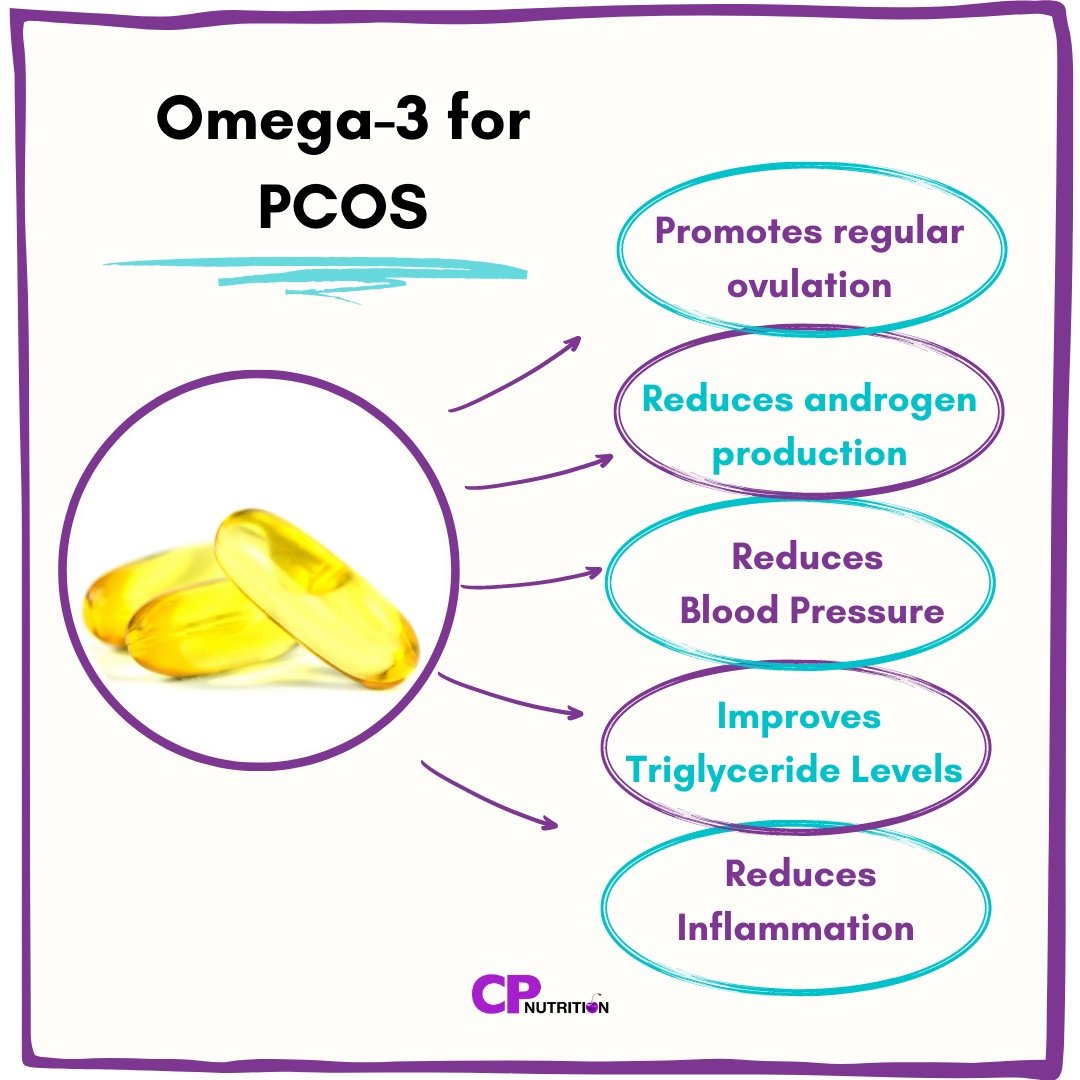Should I Take Omega-3 Supplements for PCOS?
If you have PCOS then you may be overwhelmed with the choice of supplements out there which claim to help manage your symptoms.
PCOS is a common endocrine disorder with reproductive and metabolic consequences which impacts 1 in 10 people with ovaries in the UK (1). Symptoms of PCOS include acne, oily skin, hair loss, excessive hair growth, irregular periods, infertility and weight gain (2). Diet plays an important role in managing PCOS symptoms but in some instances, supplements can help support this.
Omega-3 and Health
Omega-3 is a group of polyunsaturated fatty acids consisting of alpha-linolenic acid (ALA), eicosapentaenoic acid (EPA) and docosahexaenoic acid (DHA). Omega-3 fatty acids are considered essential because they cannot be made by the body although EPA and DHA can be synthesised from ALA. Making EPA and DHA from ALA takes a long time and only small amounts are produced. Therefore we should ensure we consume plenty of omega-3 fatty acids in our diets.
Omega-3 fatty acids are key components of cell membranes and are important signalling molecules. Omega-3 has been seen to reduce blood pressure, to be beneficial for our heart and our brain (3). There is also evidence of omega-3 being improving memory and treating depression (4).
Check out this blog post if you want to know more about the health benefits of omega 3 fats.
Omega-3 and PCOS
The research around omega-3 and PCOS shows that higher omega-3 intakes have been negatively correlated with PCOS and PCOS related factors such as testosterone and insulin levels, (i.e. the more omega-3 fats you eat, the lower your insulin or testosterone levels), and similarly when blood levels of omega-3s are measured there is a similar negative correlation between omega-3 status and PCOS prevalence (5). This observational data suggests there is a relationship between omega-3 and PCOS and interventional studies have shown that in those with PCOS, omega-3 can promote regular ovulation, reduce androgren levels, reduce triglycerides and reduce blood pressure, as well as reduce the chronic inflammation (6) seen with this condition so ensuring you are getting enough in your diet may help you manage your symptoms (7).
Dietary Sources of Omega-3
Omega-3 can primarily be found in oily fish such as salmon, sardines, mackerel, kippers and fresh crab and we are advised to consume two portions a week.
Try this coconut lime salmon recipe for one of your two portions a week. It’s a real crowd pleaser!
If you don’t like or don’t eat fish then nuts, seeds, vegetable oils, soya products and green leafy vegetables also contain omega-3 but some people prefer to take a supplement. Fish oil or algae omega-3 supplements could be useful for people with PCOS.
Omega-3 supplements are just one of the supplements that you may want to include in your diet. You can read more about some of the other common supplements in PCOS on the blog.
Remember to speak with your GP or a nutrition professional before taking supplements.
If you would like more personalised advice about optimal nutrition to help in managing your PCOS symptoms, get in touch to book a FREE discovery call to find out more about my 1:1 consultations.
References:
BDA, 2019. Polycystic Ovary Syndrome (PCOS) and diet: Food Fact Sheet. Available from: https://www.bda.uk.com/resource/polycystic-ovary-syndrome-pcos-diet.html.
NHS, 2019. Symptoms Polycystic ovary syndrome[online]. Available from: https://www.nhs.uk/conditions/polycystic-ovary-syndrome-pcos/symptoms/
Calder, P., 2017. New evidence that omega 3 fatty acids have a role in primary prevention of coronary heart disease, Journal of Public Health and Emergency, available online: http://jphe.amegroups.com/article/view/3849/4641
Grosso, G., Pajak, A., Marventano, S., Castellano, S., Galvano, F., Bucolo, C., Drago, F. and Caraci, F., 2014. Role of Omega-3 Fatty Acids in the Treatment of Depressive Disorders: A Comprehensive Meta-Analysis of Randomized Clinical Trials. PLoS ONE, 9(5), p.e96905.
Lu L, Li X, Lv L, Xu Y, Wu B, Huang C. Dietary and serum n-3 PUFA and polycystic ovary syndrome: a matched case-control study. Br J Nutr. 2021 Aug 10:1-10. doi: 10.1017/S0007114521003007. Epub ahead of print. PMID: 34372961.
Simopoulos, A., 2002. Omega-3 Fatty Acids in Inflammation and Autoimmune Diseases. Journal of the American College of Nutrition, 21(6), pp.495-505.
Nadjarzadeh,A., Firouzabadi,R.D., Vaziri,N., Daneshbodi,H., Lotfi,M.H., Mozaffari-Khosravi,H., 2013. The effect of omega-3 supplementation on androgen profile and menstrual status in women with polycystic ovary syndrome: A randomized clinical trial. Iran J Reprod Med[online], 11(8), 665-672.


